
The Forty-Eighters were Europeans who participated in or supported the Revolutions of 1848 that swept Europe. In the German Confederation, the Forty-Eighters favoured unification of Germany, a more democratic government, and guarantees of human rights. Disappointed at the failure of the revolution to bring about the reform of the system of government in Germany or the Austrian Empire and sometimes on the government's wanted list because of their involvement in the revolution, they gave up their old lives to try again abroad, emigrating to Australia, the United Kingdom, and the United States. These included Germans, Czechs, Hungarians, and others. A large number were respected, politically active, wealthy, and well-educated, and found success in their new countries.

The Baltimore riot of 1861 was a civil conflict on Friday, April 19, 1861, on Pratt Street, in Baltimore, Maryland. It occurred between antiwar "Copperhead" Democrats and other Southern/Confederate sympathizers on one side, and on the other, members of Massachusetts and Pennsylvania state militia regiments en route to the national capital at Washington who had been called up for federal service. The fighting began at the President Street Station, spreading throughout President Street and subsequently to Howard Street, where it ended at the Camden Street Station. The riot produced the first deaths of Union volunteers by hostile action, although caused by civilians, in the American Civil War. Civilians among the attackers also were killed.

Benjamin Chew Howard was a Maryland politician and lawyer. After serving on the city council of Baltimore in 1820 and in both houses of the Maryland legislature, he was a Representative in the United States Congress from 1829 to 1833, and from 1835 to 1839. He was thereafter the fifth reporter of decisions of the United States Supreme Court, serving from 1843 to 1860.
Mathematische Annalen is a German mathematical research journal founded in 1868 by Alfred Clebsch and Carl Neumann. Subsequent managing editors were Felix Klein, David Hilbert, Otto Blumenthal, Erich Hecke, Heinrich Behnke, Hans Grauert, Heinz Bauer, Herbert Amann, Jean-Pierre Bourguignon, Wolfgang Lück, and Nigel Hitchin. Currently, the managing editor of Mathematische Annalen is Thomas Schick.

Franz Sigel was a German American military officer, revolutionary and immigrant to the United States who was a teacher, newspaperman, politician, and served as a Union major general in the American Civil War. His ability to recruit German-speaking immigrants to the Union armies received the approval of President Abraham Lincoln, but he was strongly disliked by General-in-Chief Henry Halleck.

Adolf Schärf was an Austrian politician of the Socialist Party of Austria (SPÖ). He served as Vice-Chancellor from 1945 to 1957 and as President of Austria from 1957 until his death.

Alexander Contee Hanson was an American lawyer, publisher, and statesman. He represented the third district of Maryland in the U.S. House, and the state of Maryland in the U.S. Senate.
Georg Caspar Wecker was a German Baroque organist and composer. A minor composer of the Nuremberg school, Wecker is now best remembered as one of Johann Pachelbel's first teachers.
The 17th century organ composers of Germany can be divided into two primary schools: the north German school and the south German school. The stylistic differences were dictated not only by teacher-pupil traditions and international influences, but also by separate organ building traditions: northern organs tend to have a tower layout with emphasis on the pedal division, while southern and Austrian instruments are typically divided around a window and emphasize manual divisions.

Illinois Staats-Zeitung was one of the most well-known German-language newspapers of the United States; it was published in Chicago from 1848 until 1922. Along with the Westliche Post and Anzeiger des Westens, both of St. Louis, it was one of the three most successful German-language newspapers in the United States Midwest, and described as "the leading Republican paper of the Northwest", alongside the Chicago Tribune. By 1876, the paper was printing 14,000 copies an hour and was second only to the Tribune in citywide circulation.

Westliche Post was a German-language daily newspaper published in St. Louis, Missouri. The Westliche Post was Republican in politics. Carl Schurz was a part owner for a time, and served as a U.S. Senator from Missouri for a portion of that time.
Der Baltimore Wecker was a daily paper published in the German language in Baltimore, Maryland. It was the object of violence in the civil unrest at Baltimore in April 1861 that produced the first bloodshed of the American Civil War.

Carl Daenzer [In Germany, Karl] founded the Westliche Post and was a long-time editor of the Anzeiger des Westens, two noted German-language newspapers in St. Louis, Missouri. He and Emil Preetorius were the Nestors of the German American press in the United States.
The history of the Germans in Baltimore began in the 17th century. During the 19th century, the Port of Baltimore was the second-leading port of entry for immigrants, after Ellis Island in New York City. Many Germans immigrated to Baltimore during this time.
The following is a timeline of the history of the city of Baltimore, Maryland, USA.

John Thomas Scharf was an American historian, author, journalist, antiquarian, politician, lawyer and Confederate States of America soldier and sailor. He is best known for his published historical works. Modern historians and researchers cite his comprehensive histories as primary source materials.

Frederick Raine was a German-American newspaper editor and later diplomat.
The Germany men's national artistic gymnastics team represents Germany in FIG international competitions.
Nicholas Hasselbach was a German-American printer, part of a mass migration from Germany who emigrated to Philadelphia in the mid-18th century. He operated a paper mill near Philadelphia, after which he removed to Baltimore, Maryland, where he established that city's first printing press. He was one of the few German speaking printers who that wanted to print religious literature in German. Hasselbach died unexpectedly as a relatively young man, leaving only one known example of his printing, a small book, now owned by a private collector.











